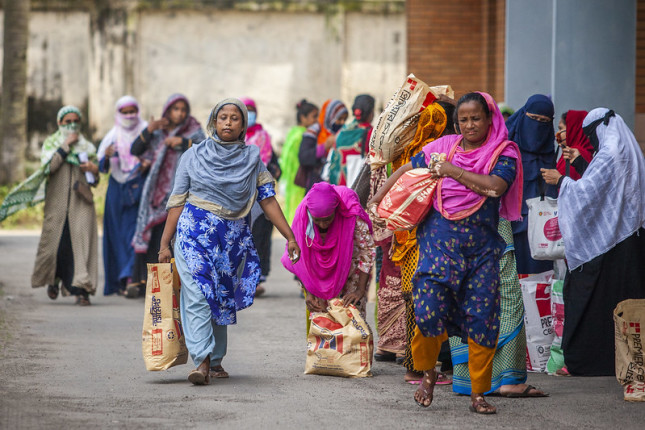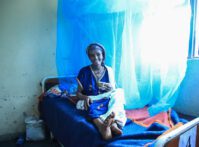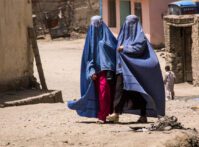-
Whisper Networks in a Wider World of Oppression

Abortion restrictions may create obstacles for legal access, but they do nothing to eliminate the need for life-saving reproductive healthcare. And when there is a lack of licit opportunities to obtain that care, patients find pathways to get it through alternative networks.
For instance, after the U.S. Supreme Court’s Dobbs v. Jackson decision in June 2022 reversed a decades-long precedent protecting the constitutional right to an abortion, social media and online forums were filled with reactions and resources alike. Among these interventions were viral posts circulated offering to host anyone going on a “camping” trip in a state with legally protected reproductive rights. These “camping trip” posts alluded to a willingness to aid and abet individuals traveling for abortions in states with legally-protected access—and they captured the complications and conflicts embedded in these responses to the ruling.
Reproductive rights organizers argued against the posts, warning that “without having proper training or resources, they are overlooking the support networks that already exist.” Yet these “camping” posts also show a willingness to participate via social media in informal communication networks that have a long history and incredible value. Known as “whisper networks,” these informal messages have an importance beyond reproductive healthcare access Indeed, they offer a window into understanding how migrant groups and others who need to communicate in confidence survive, earn livelihoods, and navigate oppressive structures.
Many Voices, Many Modes
In the early days of the #MeToo movement, Newsweek magazine defined a whisper network as “an informal chain of conversations… about men who need to be watched because of rumors, allegations or known incidents of sexual misconduct, harassment or assault.” In the post #MeToo era, the whisper networks established among women and victims of gender harassment and violence have gone mainstream.
Yet as with many phenomena studied within feminism and gender, there is an intersectional aspect to whisper networks. The informal communication at the heart of whisper networks comes in many forms that predate the #MeToo movement and have existed outside of it historically. Whisper networks are not limited to a single context, and they occur in a wide variety of marginalized communities. Queer communities globally have used—and continue to use—coded language to determine safety around other individuals who may or may not be an ally or a part of the queer community. Migrants in any new community also rely on such networks to navigate complex systems.
Such conversations, networks, and codes are a part of the infrastructure of resources that allow for the navigation of differences within societies. While not without problematic exclusions, the information shared via whisper networks can provide essential answers to people who may lack influence within a given community: Which employers are safe to work for? Which landlords accept housing vouchers? Which neighborhoods will call the police on folks they don’t recognize? This knowledge can enable success—or even provide for basic survival.
A recent example of the vulnerabilities that whisper networks can address—and the challenges those who use them can face— occurred in September 2022 when Florida officials organized a flight carrying dozens of Venezuelan migrants from Texas to Massachusetts. This conveyance of migrants to Martha’s Vineyard without any logistical support left the group wandering on foot in the town, shocking local residents and state officials.
Subsequent reports established that a woman calling herself “Perla” approached migrants outside shelters and resource centers in Texas and promised them various forms of security—food, jobs, money, lodging—if they agreed to participate in the flight. (She even offered one man $200 to help recruit others to do so.) Those responsible for recruiting and transporting migrants in this case capitalized on the trust that their fellow human beings placed on informal communication that usually serves as a form of protection. These actors weaponized the principles underlying effective whisper networks for political gain, when a true whisper network could have provided the migrants involved in the scheme with protection.
Complexity and Connection
In larger social and political currents, whisper networks are especially important from an intersectional perspective. Some networks exist because of the specific exclusion of an ethnic, religious, or other group. Others are truly a place where marginalized individuals can preserve culture and find community.
For instance, Vietnamese cosmetic nail technicians in the United States are scrutinized—and even criticized—for speaking in their native language during client treatments, drawing the ire of clients who are displeased because they do not understand. Researchers Kevin Le & Thuy Trang poignantly describe the mockery endured by Vietnamese immigrants for speaking their native language on the job in an industry where conditions include incredibly long work days, low wages, and long-term exposure to toxic chemicals. This window into a whisper network demonstrates that it is problematic at best, and actively harmful at worst, to dismiss and discourage communication within any community. Such small networks provide an integral social fabric for those within them, and can help to enable survival for many.
Migrant whisper networks also provide an antidote to conventional wisdom. The public-facing rhetoric around migration posits a singular image of predatory and violent men smuggling groups across borders. Yet despite the involvement of dangerous and opportunistic actors who are essential actors in transnational refugee movements and migration, this narrative does not capture the full picture. The road to a new country is often full of the exchange of essential informal communications, unwritten roadmaps that offer a path through danger to a new part of the world that compels new arrivals to navigate a complex social network. These subtle channels of communication exist outside of U.S. mainstream narratives, and the agency and power that flows through them likely explains why they are both effective and underestimated by those in power and ordinary citizens.
Finding a Place
Lack of social and political opportunity via other avenues lends significant prominence to whisper networks for those who must use them to access rights or advocate for themselves. Standard political activities and visibility are less open to marginalized groups, who instead find solace and power in whisper networks. A study of immigrants coming to Germany from different countries found that lack of social engagement reduced access to social protection despite the fact that all migrants arrived in the same host society and faced similar challenges.
Politics also plays a role in why whisper networks draw such attention from groups that are not privy to these conversations. According to a survey data from the IVPARC, there is little openness to immigrant political activity from members of the host society. In fact, these activities are discouraged by respondents whether they promote extreme visibility (protests)— or if they are more individual activities (signing petitions). Indeed, about thirty-three percent of those surveyed answered that immigrants should not have the right to sign petitions, a higher percentage than any other political act addressed in the survey.
Informal communication networks move information and help people in ways that deserves the attention of policymakers, advocates, research and journalists. Yet any efforts to marry whisper networks with formality and policy should acknowledge that these informal structures cannot and should not replace existing protective institutions. Informal communication must be protected as governments and societies prioritize creating formal opportunities for greater community engagement. The phrase “Don’t wait for a seat at the table, build your own” is at the center of the creation of whisper networks of all sorts. Yet they cannot replace a fully just and inclusive society that protects and nurtures all of its citizens regardless of background—as well as its new arrivals.
Chris Langevin is a doctoral researcher in Global Governance and Human Security at University of Massachusetts Boston.
Julia McCoy is a PhD student in English Literature at the University of New Hampshire.
Sources: Boston Globe; Immigrant Visibility and Political Activism Research Collaborative (IVPARC); Journal of Ethnic and Migration Studies; NBC News; Newsweek; NPR; TED; VSA Academy
Photo Credit: Women migrant workers walking along a road, courtesy of Flickr user UN Women Asia and the Pacific.
 A Publication of the Stimson Center.
A Publication of the Stimson Center.







